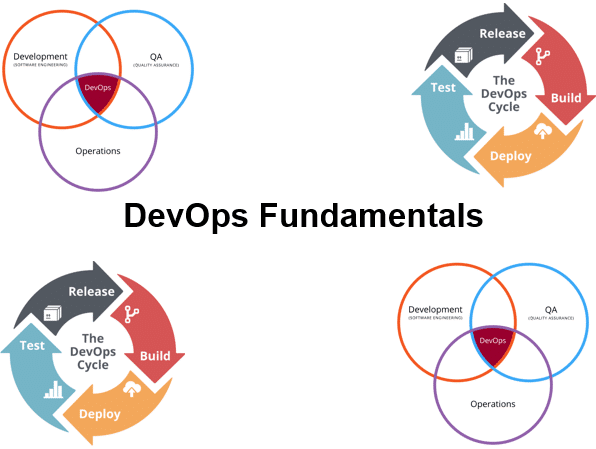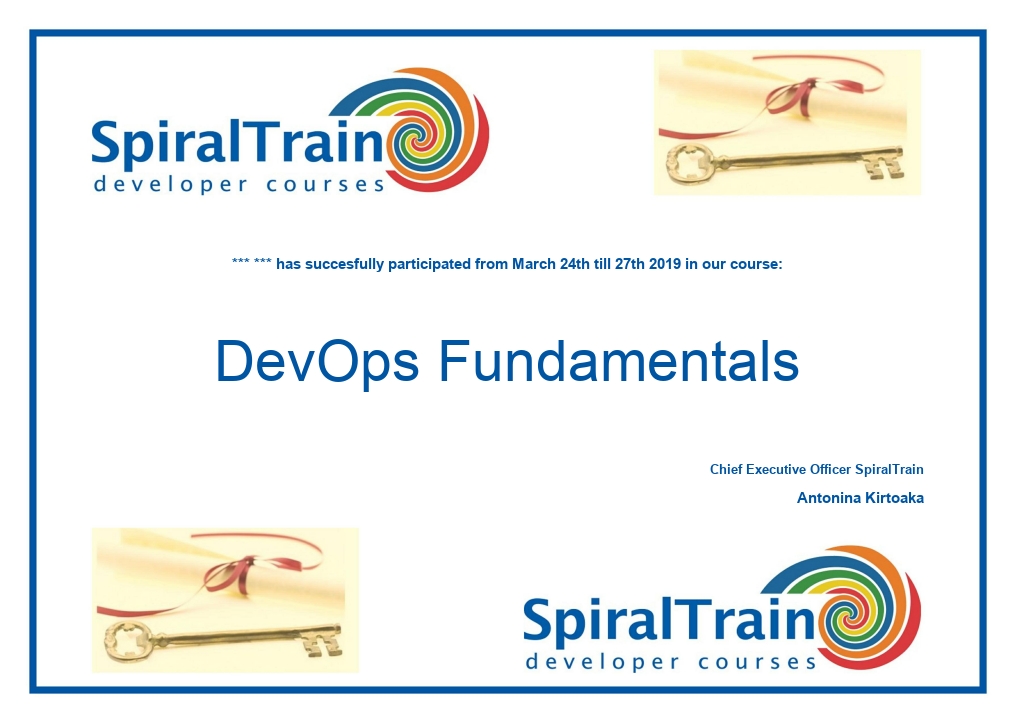-
Learning by doing
-
Trainers with practical experience
-
Classroom training
-
Detailed course material
-
Clear content description
-
Tailormade content possible
-
Training that proceeds
-
Small groups
In the course DevOps Fundamentals from SpiralTrain participants learn the benefits of a close collaboration between Development and Operations. By using DevOps organizations can enhance the speed of the production and deployment of software applications and services and make them better. DevOps also includes the automation of code deployment, avoiding human error and making the process reproducible.
The course starts with an overview of the circumstances that led to the introduction of DevOps. It is discussed how in the time before DevOps development, testing and deployment activities were isolated activities with their own planning and how a lot of time was lost as a result. The relationship between DevOps and the Agile Development methodology is also treated.
Subsequently attention is paid how these activities are coordinated in DevOps, resulting in a faster turn around time. The importance of ownership and accountability for enhancing quality in DevOps is also emphasized. And the role of automating tests and deployment is also discussed.
The different phases of the development and deployment process and how they are coordinated in DevOps are treated. Attention is paid to the management of planning, development, testing, release and deployment.
And not only the technique is part of the course. The DevOps culture, the importance of hard and soft skills, the various roles and responsibilities, troubleshooting and problem solving are also part of the course program.
Finally attention is paid to the tooling that can be used in DevOps processes such as Chef, Puppet or Ansible for configuration management, Nagios for monitoring and Jenkins, Bamboo or TeamCity for continuous integration.
The course DevOps Fundamentals is intended for anyone involved in IT development, IT operations or services and who wants to learn what is meant by a DevOps way of working.
Familiarity with the Agile Development methodology and Scrum is beneficial for the understanding, but is not strictly necessary.
The concepts are discussed through interactive sessions, exercises and short workshops. Course times are from 9.30 to 16.30.
After successful completion of the course the participants receive an official certificate DevOps Fundamentals.

Module 1 : DevOps Intro |
Module 2 : Architecture Features |
Module 3 : DevOps Lifecycle |
|
What is DevOps? Development and Operations Faster Deployment Automated Deployment DevOps Roots Agile Methodology Versioning Time to Market Reproducibility Quality Assurance Manageable Chunks |
Collaboration Work as One Team Strengthening Accountability Strengthening Ownership End-To-End Responsibility Automation Automated Tests Automated Deployment Continuous Improvement Integration Configuration Management |
Continuous DevOps Planning Get Teams in Sync Development Stage Testing by QA team Continuous Integration Release New Version Release Management Deployment Process System Monitoring Team Collaboration |
Module 4 : DevOps Engineers |
Module 5 : DevOps Automation Tools |
|
|
DevOps Culture System Operators Software Developers Production IT Staff Hard and Soft Skills Understanding Lifecycle Engineer Roles Engineer Responsibilities System Troubleshooting Problem Solving |
Infrastructure Automation AWS and Azure Configuration Management Chef, Puppet or Ansible Monitoring with Nagios Deployment Automation Jenkins, Bamboo, Team City Log Management with Splunk Performance Management App Dynamic |
